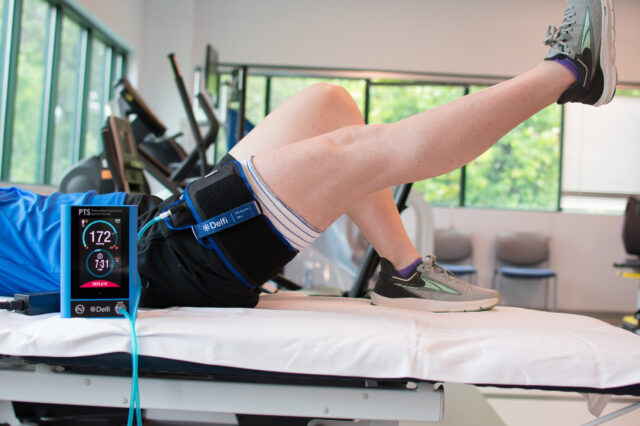UF Health Jacksonville is leading the way in the care of arthritis in our region by integrating the most advanced therapies into a comprehensive treatment program for our patients. Your care begins with our renowned rheumatologists, who have extensive knowledge in diagnosing and treating arthritis and other autoimmune disorders that affect the joints and soft tissues.
Our dedicated team also includes experts in pain management, rehabilitation and orthopaedic surgery. Focusing on the entire patient rather than a disease process, our team will work together to find solutions to relieve your pain, preserve your mobility and joint function, and improve your quality of life.
What is arthritis?
The term arthritis refers to a category of diseases that cause inflammation, stiffness and pain in joints and the body’s connective tissues, such as muscles, tendons or ligaments. There are many types of arthritis, some affecting people of all ages and others occurring predominantly in older individuals. With its many forms, arthritis affects millions of people and is now the leading cause of disability in the United States.
Arthritis: Types
Here are some of the most common types of arthritis:
- Osteoarthritis is the most common type of arthritis. It is a degenerative joint disease, most often occurring in the hands, spine, hips and knees, though it can damage any joint by breaking down the cartilage covering the ends of bones. It affects people differently, with pain ranging from mild to significant.
- Inflammatory arthritis includes:
- Rheumatoid arthritis is the most common inflammatory disorder that affects the joint linings and can result in bone damage and deformity. In some cases, it can also damage the heart, lungs and other organs. Early diagnosis and prompt treatment are key to avoiding these more serious outcomes. It is considered an autoimmune disease, which occurs when your immune system mistakenly attacks and destroys your healthy tissues.
- Psoriatic arthritis is linked with psoriasis, a chronic disease that causes scaly, red rashes on the skin and thickened, pitted fingernails. This form of arthritis causes joint swelling and symptoms which can affect large and small joints as well as the spine.
- Gout is a common, painful form of arthritis caused by an accumulation of microscopic crystals in the joints. It occurs when the body does not eliminate enough uric acid, allowing the buildup of uric acid crystals in the small joints, resulting in swelling, redness, stiffness and pain.
- Pseudogout is another type of crystal-induced arthritis—named for its similarity to gout—that causes joint inflammation and pain. The two conditions differ in the type of crystals formed. When someone develops pseudogout, calcium pyrophosphate crystals are deposited in the joints and soft tissues, though the cause is undetermined. Named for the deposits, the condition is formally known as calcium pyrophosphate disease.
Arthritis: Symptoms
The common symptoms for most types of arthritis include pain, stiffness and swelling in the joints. With severe pain, a patient’s mobility may be greatly diminished, making it difficult to walk, climb stairs or perform regular daily functions. The severity and frequency of these symptoms vary by individual and with the type of arthritis and can sometimes worsen over time and lead to bone and joint damage.
What other diseases can present arthritis symptoms?
Connective tissue diseases often present symptoms of arthritis. These autoimmune disorders occur when your immune system attacks healthy tissues that connect with the structures of your body. Our rheumatologists have broad experience in evaluating and treating connective tissue disorders, and will coordinate your care with a multidisciplinary team including pulmonary medicine, nephrology and cardiology.
Here are the most common connective tissue diseases:
- Systemic lupus erythematosus (SLE) is commonly known as lupus. It can be mild or severe and can affect many parts of the body. Symptoms vary by patient but can include facial rashes, fever, painful or swollen joints, muscle pain, fatigue and sensitivity to the sun. There is no cure for lupus and the diagnosis can be difficult because many of the symptoms overlap with arthritis and other conditions. Your physician will discuss your symptoms, request the appropriate testing and involve other specialists during an evaluation as needed.
- Myositis is a group of diseases that cause chronic inflammation or swelling of the muscles often as a result of an autoimmune disorder. There are several types of myositis including dermatomyositis, which also causes a rash, and polymyositis, which occurs in the muscles throughout the body. These diseases can cause pain and muscle weakness over time.
- Scleroderma is chronic disease that causes abnormal growth of the connective tissue and affects the skin, joints, blood vessels and internal organs. Organ damage may occur, which can lead to lung, kidney, or heart failure and other life-threatening conditions. Symptoms include swelling of the fingers, thickening or hardening of the skin, joint pain and stiffness and problems swallowing.
- Mixed connective tissue disease (MTCD) is a rare autoimmune disease that presents symptoms of three other connective diseases: systemic lupus erythematosus (SLE), scleroderma and polymyositis, which can impact both the skin and musculoskeletal system. Symptoms for each disease present at different intervals, making diagnosis difficult.
- Sjögren's syndrome is an autoimmune disorder that targets the glands that keep the eyes, mouth and other body parts moist. While the disease can vary widely in severity among individuals, the most common symptoms are extreme dry eyes and mouth. The syndrome may also cause fatigue and joint pain, swelling and stiffness. Several tests can be performed to rule out other diseases that this syndrome tends to mimic.
Arthritis: Diagnosis
After a physical exam and discussing your symptoms, your physician may refer you to a rheumatologist. With further testing and the use of advanced imaging techniques, a rheumatologist will focus on locating the source of the symptoms and identifying the type of arthritis.
UF Health Rheumatology in Jacksonville is home to distinguished rheumatologists who diagnosis and treat many forms of arthritis and connective tissue disease. For advanced diagnosis, our rheumatologists use a musculoskeletal ultrasound. This state-of-the-art imaging system provides high-definition images of joint tissues, tendons and soft tissue to help pinpoint the source of the pain and identify early forms of various types of arthritis, such as rheumatoid arthritis, psoriatic arthritis and gout. The images can also reveal nerve entrapment in the limbs, such as carpal tunnel syndrome. If local injections are prescribed, physicians will rely on ultrasound visualization for placement assistance.
Arthritis: Treatment
Arthritis treatment options at UF Health Jacksonville include:
- Non-opioid pain management techniques: For every way you can feel pain, there are potential remedies to reduce it. Led by accomplished pain researchers and educators, the UF Pain Assessment and Management Initiative (PAMI), works with emergency department, postoperative and hospital patients to provide integrative and non-opioid pain management options and toolkit items customized to your pain needs and management plan. Patients also have the option to work with a pain coach educator and receive access to self-management materials through webinars, educational videos, OTC dosing guides, and a pain discharge planning toolkit including items such as aromatherapy, virtual reality, hot/cold gel packs and pain journals.
- Outpatient Pain Management Center: To treat chronic arthritis pain, our pain medicine physicians provide you with comprehensive management, which includes pain evaluations and needed referrals for imaging, physical therapy or an evaluation by a surgical specialist. To control pain, the physicians also prescribe medications and nonpharmacological techniques, use injections to decrease inflammation and pain in your joints and provide minimally invasive techniques to remove nerve tissue and block the transmission of pain.
- Inpatient pain management resources: When you undergo surgery for conditions related to arthritis, bone and joint disease, our anesthesiologists, trained in acute pain management, help patients find comfort by providing nerve blocks to decrease acute pain during recovery as well as medications. In conjunction with orthopaedic colleagues, these anesthesiologists have developed protocols to speed recovery after your surgery using anesthetic techniques and pain medications.
- Physical rehabilitation: With five locations for physical therapy, UF Health Jacksonville offers options for comprehensive assessment and treatment. Physical therapists can help improve your strength and range of motion and help you to regain mobility and independence. To continue helping after your therapy, you will receive instructions on ways to reduce arthritic pain by adjusting your daily activities





